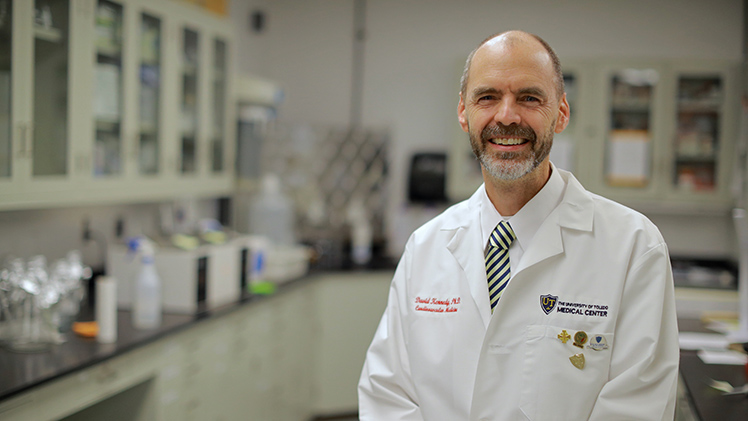A University of Toledo biomedical scientist has been chosen to lead one of the country’s oldest academic medical societies.
Dr. David Kennedy, an associate professor of medicine, will begin his term as president of the Central Society for Clinical and Translational Research following the group’s annual meeting in April.

Dr. David Kennedy, an associate professor of medicine in the College of Medicine and Life Sciences.
Kennedy, whose research includes study of the health effects of freshwater pollution and harmful algal blooms, is the first basic scientist to lead the society in its nearly 100-year history.
“All through my training I’ve really enjoyed working with and learning from physicians, and I appreciate how they think about things,” he said. “The heart of translational research is being able to bring clinical and basic science together. So, my training was a natural fit to help the society reach out to more basic scientists and bring them into the fold so we have a robust society that isn’t just clinicians who are talking to each other, but scientists at all different levels from all different disciplines. I think they wanted someone who could bring in and draw from the real experience of translational science.”
Kennedy currently serves as secretary-treasurer of the society.
The Central Society for Clinical and Translational Research was founded in 1928 to give Midwestern physicians of different specialties a place to come together to discuss and solve complicated medical problems. The society later welcomed basic science researchers.
“Medical societies, particularly then, tended to be very focused on one single issue. You still see that today, with many organizations remaining very siloed,” Kennedy said. “What makes our organization distinct is it’s multidisciplinary. Medicine is complex, and if you really want do things that are impactful, you’d better be able to communicate what you’re doing across a spectrum and you’d better be able to learn from the successful ways other people have done things in their discipline and be able to apply those lessons.”
Broadly, the society’s goal is to develop and support communication, collaboration and career development of medical researchers in the central part of the U.S., though the group has members nationwide.
Kennedy said he hopes his term as president can help to elevate the regional and profile of UToledo and introduce others to the scientific advancements happening here.
He’s also looking to expand the society more deeply into the area of environmental human health based on the strength of UToledo’s work in that field.
“The complex challenges of understanding the influence of the environment on our health presents a perfect opportunity for a multispecialty Society like the CSCTR to lead impactful research in this area,” Kennedy said. “I’m excited to bring together clinicians and basic scientists across the translational research spectrum so we can advance solutions for these intricate challenges.”